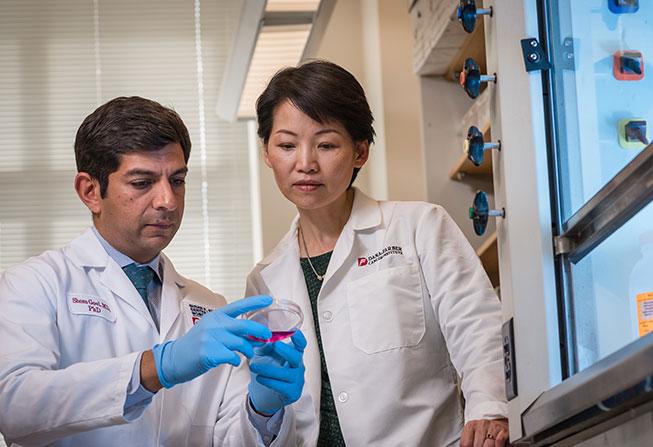Signaling Mechanisms Controlling Tumor Growth and Immune System Interactions

Complex molecular pathways control whether cells grow, divide, differentiate or die. Cancer, the uncontrolled growth of cells, results from disruption of these molecular pathways. Determining the molecular basis of pathways controlling normal and cancerous cell growth identifies potential targets for anti-cancer therapies. Members of our department investigate molecular pathways that control normal cell growth, and how their disruption leads to cancer. This research identifies molecular vulnerabilities in cancer cells that form the basis for developing new anti-cancer therapies.
- The Livingston Lab defines the functions of breast cancer susceptibility genes, BRCA1 and BRCA2.
- The Zhao Lab uses mouse models and tools from chemical and systems biology to determine the specific roles of various kinases, including the catalytic isoforms of PI3K in both normal physiology and cancer. The lab specializes in the effects of signaling on cancer immunology.
- The Roberts Lab studies how kinases promote cell growth, and applies this understanding to the development of new drugs that target actions of specific kinases.
- The Sicinski Lab characterizes the roles of cell cycle regulators in normal and cancer cells, and investigates the utility of targeting particular components of the cell cycle machinery for cancer treatment.
- The Haigis Lab studies the cellular and molecular mechanisms underlying diseases of the gastrointestinal tract. The lab is investigating the biology of RAS family oncogenes in colorectal cancer and pancreatic ductal adenocarcinomas and protein signaling networks in inflammatory bowel disease.
- The Zhou Lab designs new signaling proteins to enact specific anti-tumor responses; the lab engineers dynamic, functional proteins that respond to various protein post-translational modifications, conformations, or complexes, and harnesses these synthetic proteins to direct immune responses to cancer.